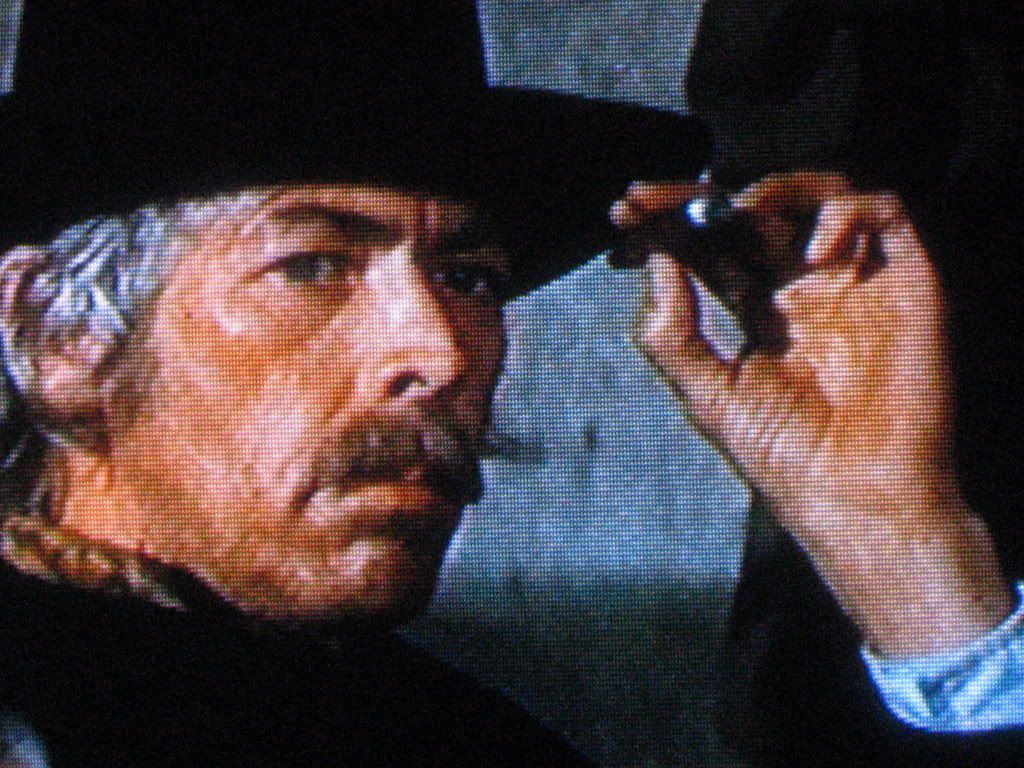Saturday night I was in
Both shows were memorable, with performances of songs I hadn’t heard in the handful of times I’d seen him previously: “Employee of the Month,” from his Dim Stars, Bright Sky album and the heartbreaking “Ultimately Yrs.” from Freedom Is… The second set was looser, as you might expect. He likes to chat to his audience, and his between-songs musings are self-effacing and often very funny; he has an easy rapport with audiences that only enhances the inclusive, personable mood of his solo shows. As his music has proved for three decades now, he has a gift for direct sentiment, expressed honestly.
At one point, he dedicated a song to the late director Sam Peckinpah (THE WILD BUNCH, BRING ME THE HEAD OF ALFREDO GARCIA), commenting that he wished Sam was still alive and making movies. He strummed a chord and paused, reconsidering the idea. He explained it was hard to accept Peckinpah's movies unconditionally because they’re all fairly misogynist. You can't make excuses for that kind of thing, he continued, “because it's like someone saying, 'We're going to make a movie (calling people) “niggers”… But it'll be good!’ You can't do that," he admonished good naturedly. He went on to amend his endorsement of Peckinpah, clarifying that his movies are full of great parts, “especially PAT GARRETT & BILLY THE KID.”
Later, my date (Sandee Curry, who, coincidentally, immortalized McCabe’s for Not For Tourists) said she didn’t think of Peckinpah's movies as misogynist, at least not based on the handful she'd seen. I’ve seen and liked most of Peckinpah’s movies, but I disagreed with her. For me there was no denying the presence of, at the very least, sexist elements in his work. I suppose you could argue that Peckinpah’s films tend to be set in sexist/misogynist worlds, but then you’d only be making John Doe’s point for him, I think.
But these are strange times. Things that may have come across as misogynist twenty years or more years ago are not necessarily seen that way today, by women or men. This may be at least partly attributable to the more recent development of a philosophy based on reinterpretation and subversion, where one seeks out the kernel of truth or the admirable quality at the core of a broad or stereotypical thing and claim it for yourself, own it. Forty years is enough time for Tura Satana in FASTER, PUSSYCAT! KILL! KILL! to undergo a cultural transformation from men’s sex object to women’s role model, and fifty is enough for pin-up queen Bettie Page to transition from the raincoat crowd to the Camille Paglia set. It may well be that the passage of thirty-odd years has provided adequate distance to reconsider even Susan George’s Amy Sumner in STRAW DOGS.
It could also be that many past offenses are dulled when compared with contemporary efforts. The unapologetic machismo of a Sam Peckinpah film is a very different beast from the unapologetic machismo frequently on display in today’s popular culture; the old fears and hatreds somehow swell up a whole lot uglier these days.
But John Doe is someone who rose to prominence through hand-in-glove collaborations with a tremendously gifted and very influential woman, Exene Cervenka, and he continues to work closely in collaboration with female artists. He's also a husband and father to daughters and, as he boasted at the McCabe's shows, is a proud soccer coach to "a group of sixteen-year-old girls" undefeated in their division. And once you’ve gained that kind of perspective, it gets a lot harder to make excuses for what you perceive as misogynist attitudes in other artists’ work, even if you like the rest of it quite a bit.
And whether you agree or disagree with his off-the-cuff reading of Peckinpah, it's somehow reassuring when someone who can draw a crowd makes a point of reminding their audience—perhaps even as they remind themselves—that regardless of talent, nobody's entitled to a pass on the important stuff.
He's right about PAT GARRETT, too. It's a great fucking movie.
